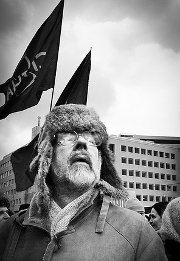USA/China (MNN) — A visit to the U.S.
by China's presumptive next president,
Xi Jinping, has not been without its controversy.
Protestors have been gathered outside
of the buildings where high-level meetings are being held. One bombshell released by religious freedom
advocates this week: an official snub to a religious envoy.
Lindsay Vessey, the advocacy
coordinator for Open Doors USA, explains. "Dr. Suzan Johnson-Cook, who is
the ambassador for international religious freedom, was supposed to go to China
earlier this month to meet with a number of people who have been persecuted for
their faith. She was actually denied her visa by the Chinese government."
Meetings Johnson-Cook was to have been
a part of were cancelled. Without
meetings, China said there was no reason to need a visit. Interestingly, the snub was already known in
Washington prior to Xi's arrival. Vessey says, "One of the
things that was stated by these advocates who kind of broke the story is that
the State Department, and the Obama Administration actually directed that they
not talk about the denied visa in advance of Xi Jinping's visit."
In a time when China is concerned
about its internal security, "They've increased their internal security budget even more than
their national defense budget," says Vessey. "They believe often that people who are
Christians, Falun Gang practitioners, or Muslims are a threat
to State security."
Such scrutiny makes it all the more
important for Johnson-Cook to speak out. The silence from Washington was deafening. Vessey says the lack of open support could
undermine any further work Johnson-Cook tries to accomplish in other areas.
"This is basically demonstrating to the Chinese government that religious
freedom really isn't that important to this administration, that they're not
willing to stick their neck out and speak publicly."
Xi defended Beijing's human-rights
record, but Vessey says sweeping China's treatment of religious minorities
cannot be ignored. "That's
concerning [us] because when a government isn't willing to treat their own people
well, why should we trust them in other matters?"
Vessey notes the job will be more
complicated now. "I think it's going to make things more difficult because
in the past, we've had administrations that were more willing to be vocal in
support of Christians and other faith groups that are persecuted. And when the Chinese government is aware that people are watching and that people
are trying to hold them accountable, that really makes a difference."
Disclosure drew criticism, but it had
the intended effect. As the stir grew, the story seems to have
changed a bit. Now, White House spokesman Jay Carney says that Chinese officials have told the
White House they are working on dates for Johnson-Cook's visit.
The envoy post was created as part of
the International Religious Freedom Act of 1998, which seeks to promote
religious freedom as a U.S. foreign policy and to advocate on behalf of
individuals viewed as persecuted in foreign countries due to their religion.
Cook is the first woman and the first African-American to hold the post.

